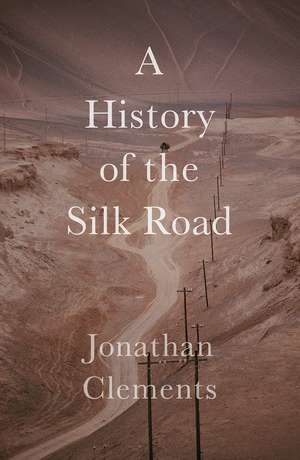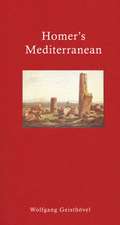A Short History of the Silk Road
Autor Jonathan Clementsen Limba Engleză Paperback – 15 sep 2017
The
Silk
Road
is
not
a
place,
but
a
journey,
a
route
from
the
edges
of
the
Mediterranean
to
the
central
plains
of
China,
through
high
mountains
and
inhospitable
deserts.
For
thousands
of
years
its
history
has
been
a
traveler’s
history,
of
brief
encounters
in
desert
towns,
snowbound
passes
and
nameless
forts.
It
was
the
conduit
that
first
brought
Buddhism,
Christianity
and
Islam
into
China,
and
the
site
of
much
of
the
“Great
Game”
between
19th-century
empires.
Today,
its
central
section
encompasses
several
former
Soviet
republics,
and
the
Chinese
Autonomous
Region
of
Xinjiang.
The
ancient
trade
route
controversially
crosses
the
sites
of
several
forgotten
kingdoms,
buried
in
sand
and
only
now
revealing
their
secrets.
A History of the Silk Roadnot only offers the reader a chronological outline of the region’s development, but also provides an invaluable introduction to its languages, literature, and arts. It takes a comprehensive and illuminating look at the rich history of this dynamic and little known region, and provides an easy-to-use reference source. Jonathan Clements pays particular attention to the fascinating historical sites which feature on any visitor’s itinerary and also gives special emphasis to the writings and reactions of travelers through the centuries.
A History of the Silk Roadnot only offers the reader a chronological outline of the region’s development, but also provides an invaluable introduction to its languages, literature, and arts. It takes a comprehensive and illuminating look at the rich history of this dynamic and little known region, and provides an easy-to-use reference source. Jonathan Clements pays particular attention to the fascinating historical sites which feature on any visitor’s itinerary and also gives special emphasis to the writings and reactions of travelers through the centuries.
Preț: 57.78 lei
Preț vechi: 69.38 lei
-17% Nou
Puncte Express: 87
Preț estimativ în valută:
11.06€ • 11.82$ • 9.22£
11.06€ • 11.82$ • 9.22£
Carte disponibilă
Livrare economică 28 martie-11 aprilie
Livrare express 13-19 martie pentru 29.82 lei
Preluare comenzi: 021 569.72.76
Specificații
ISBN-13: 9781909961371
ISBN-10: 190996137X
Pagini: 220
Ilustrații: 1 map
Dimensiuni: 127 x 203 x 23 mm
Greutate: 0.2 kg
Editura: HAUS PUBLISHING
Colecția Haus Publishing
ISBN-10: 190996137X
Pagini: 220
Ilustrații: 1 map
Dimensiuni: 127 x 203 x 23 mm
Greutate: 0.2 kg
Editura: HAUS PUBLISHING
Colecția Haus Publishing
Notă biografică
Jonathan Clements has written books on several figures associated with the Silk Road, including Kublai Khan, Marco Polo, and Empress Wu.
Cuprins
1. The Invention of the Silk Road
Beginnings and Endings
Geography and Topography
Names and Naming
Barbarians, Minorities and the Historical Record
2. From the Tarim Mummies to the Early Han Dynasty (Prehistory to AD 6)
The Discovery of Silk
Moths and Worms
Horse-riders and Horse-traders
3. The Western Regions: From Han to Tang (AD 6-618)
Armies Reach Kashgar
Silk Reaches Khotan
Buddhism Reaches China
4. The Tang Dynasty (618-907)
Tripitaka
The Christians
The Jewelled Surnames
The Tragedy of Yang Guifei
5. The Uyghurs and the Mongols (907-1408)
Barchuq Switches Sides
Marco Polo
The Muslims
6. The New Frontier (1408-1912)
Kazakhs, Kyrgyz and Kalmuks
Yaqub Beg and Kashgaria
The Tomb Raiders
7. Autonomy and Hegemny (1912-2012)
The Republic of China
The ‘Republics’ of Xinjiang
The People’s Republic of China
Whose Song is it Anyway?
8. The Silk Road Today
Ecology and Erosion
Religion and Races
Tourism and Tradition
History and Heritage
Further Reading and References
Chronology of Major Events
Index
Beginnings and Endings
Geography and Topography
Names and Naming
Barbarians, Minorities and the Historical Record
2. From the Tarim Mummies to the Early Han Dynasty (Prehistory to AD 6)
The Discovery of Silk
Moths and Worms
Horse-riders and Horse-traders
3. The Western Regions: From Han to Tang (AD 6-618)
Armies Reach Kashgar
Silk Reaches Khotan
Buddhism Reaches China
4. The Tang Dynasty (618-907)
Tripitaka
The Christians
The Jewelled Surnames
The Tragedy of Yang Guifei
5. The Uyghurs and the Mongols (907-1408)
Barchuq Switches Sides
Marco Polo
The Muslims
6. The New Frontier (1408-1912)
Kazakhs, Kyrgyz and Kalmuks
Yaqub Beg and Kashgaria
The Tomb Raiders
7. Autonomy and Hegemny (1912-2012)
The Republic of China
The ‘Republics’ of Xinjiang
The People’s Republic of China
Whose Song is it Anyway?
8. The Silk Road Today
Ecology and Erosion
Religion and Races
Tourism and Tradition
History and Heritage
Further Reading and References
Chronology of Major Events
Index
Descriere
The Silk Road is not a place, but a journey, a route from the edges of the Mediterranean to the central plains of China, through high mountains and inhospitable deserts. For thousands of years its history has been a traveler’s history, of brief encounters in desert towns, snowbound passes and nameless forts. It was the conduit that first brought Buddhism, Christianity and Islam into China, and the site of much of the “Great Game” between 19th-century empires. Today, its central section encompasses several former Soviet republics, and the Chinese Autonomous Region of Xinjiang. The ancient trade route controversially crosses the sites of several forgotten kingdoms, buried in sand and only now revealing their secrets.
A History of the Silk Road not only offers the reader a chronological outline of the region’s development, but also provides an invaluable introduction to its languages, literature, and arts. It takes a comprehensive and illuminating look at the rich history of this dynamic and little known region, and provides an easy-to-use reference source. Jonathan Clements pays particular attention to the fascinating historical sites which feature on any visitor’s itinerary and also gives special emphasis to the writings and reactions of travelers through the centuries.
A History of the Silk Road not only offers the reader a chronological outline of the region’s development, but also provides an invaluable introduction to its languages, literature, and arts. It takes a comprehensive and illuminating look at the rich history of this dynamic and little known region, and provides an easy-to-use reference source. Jonathan Clements pays particular attention to the fascinating historical sites which feature on any visitor’s itinerary and also gives special emphasis to the writings and reactions of travelers through the centuries.









